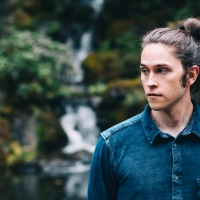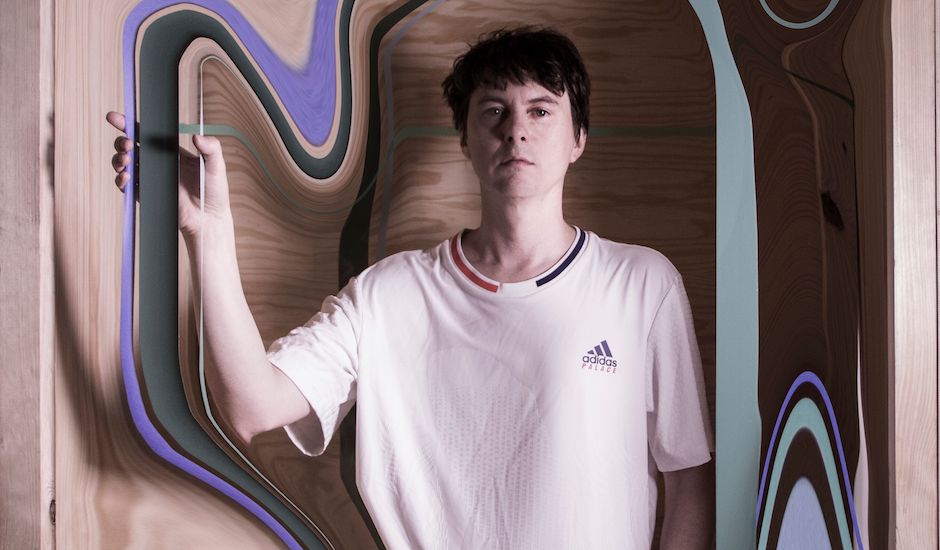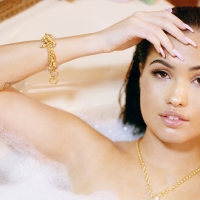 Big Wild on the risks and challenges of his debut album, SuperdreamThe Portland musician branches out into the future on his first record, out today via Counter Records/Inertia Music.
Big Wild on the risks and challenges of his debut album, SuperdreamThe Portland musician branches out into the future on his first record, out today via Counter Records/Inertia Music.

Panda Bear talks his new album Buoys and two decades of change in the music industry
The US musician and Animal Collective co-founder releases his sixth album, Buoys, today.
Words by Patrick Campbell. Header photo by Fern Pereira.
Twenty years since the release of his debut album as Panda Bear, Noah Lennox has become one of the most influential indie artists of our generation. With his solo endeavours and work with Animal Collective combined, the artist has released 15 albums and almost as many EPs. The forthcoming album, Buoys, sees Lennox step back from the intense production and themes of Panda Bear Meets The Grim Reaper, however, it stays true to the unique sounds and processes that have placed Lennox at the forefront of alternative music over the past two decades.
After such a high output of music over a relatively short time in the industry, it could be easy for Lennox to fall into old patterns with his work. This is not the case on Buoys. Working alongside producer Rusty Santos for the first time since his 2007 breakthrough album Person Pitch, Lennox has taken this album as an opportunity to update his sound, and begin a new chapter for Panda Bear. Speaking to Pilerats from his home in Lisbon Portugal, Noah Lennox talked us through the process of creating Buoys, his thoughts on the changes in the music industry, and working with Rusty Santos for the first time in twelve years.
The new album [Buoys] is your first in four years and it's a lot more intense than the Grim Reaper album, was that intentional?
As far as it feeling less intense, I would wager that that's a reflection of a mental state. Or more of a day to day existence for me. I can't say there was a blueprint or something, or that I had a plan or concept of making something that would feel a little bit more relaxed. I think it just came about organically.
I can say that there was a handful of things that I felt like I've done with the previous three records. Like production techniques and aesthetics about the production that I was sure I didn’t want to do this time. So in the absence of doing those things, it was something a bit different.
Although I didn't have a crystal clear vision of what it was going to turn into, I kind of figured it would at least be something different because there was this handful of things I knew I wasn't going to do this time.
You co-produced and co-mixed the album with Rusty Santos. How was that working together after Person Pitch which was over ten years ago?
It was pretty easy because we've known each other for a really long time, even though I really hadn't seen him in maybe six years or so. We've sent emails back and forth, here and there. That was always the way, I saw things he was working on and admired stuff that he was working on so I knew there wouldn't be any issues in that way. But on a personal level, it was really kind of just picking up where we left off, really smooth as you would say.
When it comes to making music as Panda Bear instead of making music with Animal Collective, How do you approach the two differently?
I feel like I approached them more differently in the past than now. I was writing a bunch of songs from this past October through ‘til about Christmas and it was the first time I felt I was writing stuff that I didn't know where it was headed.
It could’ve been for Animal Collective or it could’ve been solo stuff. I guess I'll have to let you know how that works out. Usually, in the past, I would always have a target for the thing, I would know it was for the band or I would know it was for myself. Kind of out of necessity because usually when writing for the band, the [song] would have to be kind of unfinished or only have a sort of pointing toward the finished thing. Whereas if I had made a demo for myself, it could be of fleshed out and already have arrangements sort of set in stone. This past six months have been the first time that I was writing stuff that could go either way.
With the band and your solo work being produced very consistently, have you ever found yourself feel pressured or overworked with the amount of music you’re creating?
I guess I'm very fatigued on the listener's or the audience's end, but for myself, I'm not worried about it. I kind of feel lucky and grateful to be able to do these things... So I try to make sure I work at it as much as I can.
I mean there is a balance that you have to strike, as far as making one do right. I'm doing right by my family and my own health and mental wellbeing, but I also feel like an obligation to the work itself. Beyond that, I just really enjoy making music, so I feel like it’s not a job, it's more like a little present or something.
If you could sort of give an introductory statement for your music to someone who hasn't heard it before what would you say?
I mean it depends what record we're talking about, but if it's Buoys, I'd probably say something like... If you listen to the radio or the kind of music around the world that you can't get away from, which I guess is a different way of saying it's mainstream music. Buoys is reflective of that in some ways, at least on the surface.
Sonically it's very similar to a lot of stuff that I hear around these days, but then on the backend, it feels very tweaked. There are idiosyncrasies to it that I feel like are more representative of who I am specifically. It might not be everybody's cup of tea, but it is what it is I suppose.
You’ve been in the music industry for quite a while now. What’s the most significant change you’ve seen in the industry?
Probably the biggest is the streaming thing. I don't know exactly how it is, but it seems like if you were starting a band in 2019, you go about it in a really different way than you would twenty years ago. Although, there are certain things that haven't changed. I mean you can still go about it in a more traditional way as far as playing shows and kind of representing yourself in a live setting. But on the other hand, you have bands or projects that put out two YouTube videos and they're massive overnight. I guess that side of things feels like a modern invention. The more I think about it; there are more traditional ways that you can make it happen. It just seems like there is more stacked up against you these days.
It's harder to get record advances because records don't sell anymore, so I feel there's more friction getting it up and running these days compared to when we started. At the same time, there are more opportunities as far as the internet and ways you can use that and social media to present your music.
Do you feel like it's easier now to share your music with the world?
I think it was easier twenty years ago because... simply for the fact that there was less visibility for stuff before. Now it seems to be more about who shouts the loudest you know? I don't mean to put a value judgment on that... It's just, with the access comes the crowds. There's so much out there and there's such simple access to it that getting your moment and separating yourself from the pack seems really difficult these days.
If you weren't making music what would you be doing?
I don't really have any skills; I have no idea. Being a janitor or working in an office. I guess whatever I could to pay the bills.

Painting by Hugo Oliveira, photo by Fern Pereira.
You live in Lisbon and moved there about a decade ago right?
Yeah, about fifteen years now.
What made you decide to move here?
I was in New York for four and a half years before living here, and I was just ready to live somewhere else. As much as I love the place, I just didn't feel like it was going to be the best place for me forever. I didn't really know where I wanted to go, but we wound up playing a festival show here at the end of a long period of touring and I just really liked it. I still really like it fifteen years later even though the city itself has changed pretty dramatically in that time. It's still my favourite place.
Do you think that living here as opposed to New York has influenced your writing and your music?
I'm sure it has. It's just really difficult to characterize that influence. I think that any creative person is somehow influenced by their environment, Whether it's conscious or subconscious.
I'm sure it's the same for me, but again it's really difficult for me to get into specifics. There's nothing I've noticed really concrete as far as the sunlight here, or seagulls, or the ocean. I felt like I was writing stuff that had ocean symbols when I was living in New York even. It's difficult to define exactly how the environment could influence what I do, but I'm sure it has at the same time.
With the new album, it's very removed from the previous records, but it's still very much a Panda Bear record. What was the process of recording Buoys?
Usually, I think about what might be a cool thing to do. It's more like daydreaming; it can sound kind of serious when I say just thinking about it. It's more like a stew that's been brewing in my brain where I'll consider what might be cool things to do or a defining aesthetic of the [song] and often that changes by the end of the cycle. I just sort of daydream about the thing for a while before I actually put my fingers on keys or anything like that. Then usually I feel like I can point to a specific moment where the song really kind of gets boring.
There's always some melody or some moment that I feel the sweetness, or the juice of the song. Then everything after that is just editing that moment or trying to refine that experience in some way. That's the typical kind of roadmap for me I guess.
For you personally, what is the peak of the album - even if it's just a moment within a song? What do you feel is the ‘centrepiece’ in a sense?
I kind of feel like the thing builds towards Inner Monologue probably. That's kind of the ‘belly of the beast’ of the album I guess. It's kind of the odd man out too. It's definitely was the one that I was like, "I don't know if this one is gonna fit on there." But it's one of the ones I always look forward to when I listen to it… Yeah, I'll go with that.
When it comes to taking this album to the live shows what are you thinking about in terms of translating a full live audience?
[Last] year I toured a couple times and I'll do a couple tours this year. I've been doing it in a way that's very similar to the past couple records, or at least Grim Reaper in my set up. Honestly, I've had ideas about doing a tour that's more performance based. I kind of want to play with a drummer and a bassist; I would play the guitar and sing it... Sort of amplify the more performative aspect of the album, which was, I guess the genesis of the thing.
It kind of felt like we recorded the performative aspects of the music and spent the rest of the time, really the majority of the time engineering those aspects to be more manufactured. I'd like to do a live set that kind of highlights the more performative aspects of it. I don't know if I'll be able to get that together for this year, but maybe 2020.
Panda Bear’s new album Buoys is out now via Domino Recordings.
Follow Panda Bear: FACEBOOK
 Big Wild on the risks and challenges of his debut album, SuperdreamThe Portland musician branches out into the future on his first record, out today via Counter Records/Inertia Music.
Big Wild on the risks and challenges of his debut album, SuperdreamThe Portland musician branches out into the future on his first record, out today via Counter Records/Inertia Music.
 With Mabel, UK pop gets an exciting new forceThe British musician, nominated for British Breakthrough Act at the Brit Awards just-gone, is one to keep an eye on.
With Mabel, UK pop gets an exciting new forceThe British musician, nominated for British Breakthrough Act at the Brit Awards just-gone, is one to keep an eye on.